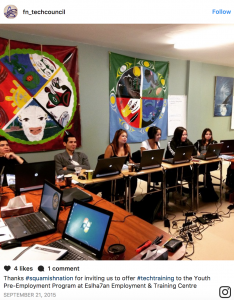Decades of oppression and forced assimilation have led to the steep decline of Indigenous languages but there is new hope as tech-savvy young people are fighting to preserve their culture. For generations, Indigenous families used storytelling as their primary way to pass down knowledge and language as elders would speak to the children in their language and the kids would naturally pick it up but that began to change in the late 19th century once the Canadian government passed the Indian Act. This law enforced colonial authority over First Nations peoples, partially to force assimilation through policies that displaced Indigenous people and removed them from their communities. Most notoriously implemented through church-run residential schools that aimed to erase Indigenous children’s cultures and connections to family, these institutions enforced a language ban. If Indigenous children were caught speaking their own language, they would face corporal punishment.
Forced assimilation largely contributed to Canada’s Indigenous language loss by barring people from continuing to pass down the language.
Denise Williams, First Nations Technology Council executive director, is aware that Indigenous memories of colonialism are inhibitors to the First Nations embracing modern technology. She is taking steps to change this. As part of a 1982 Canadian constitution amendment that allowed the integration of Indigenous people’s right to self-government, it also allowed for the adoption of contemporary software and information systems. These tools imposed on communities, added on top of an already imposed government structure, became a sore point for many First Nations people and therefore, is now the mandate of Denise and her technology council members to change this.
Even though the First Nations Technology Council faces resistance from some community members who view tech as a symbol of colonial oppression Denise and the council has spent four years visiting over one hundred Indigenous communities in B.C. carrying out mobile technological training programs to overcome this deep-seated resistance, her team providing everything from Microsoft Office certification to PC repair training. The enthusiastic feedback she received made her view tech as a key tool for Indigenous empowerment.
On the council’s website, she notes that they have seen the profound effects of increased access to digital communication through movements like Idle No More and Stand With Standing Rock, which both achieved mass impact and galvanized activism. The council’s next mandate is to empower more Indigenous people to build communities and drive economic development online. Because of the work of this council, the future for technology has potential as Indigenous people gain the skills to partake in digital conversations while increasing reconciliation making a better world for all Canadians and Indigenous people.
